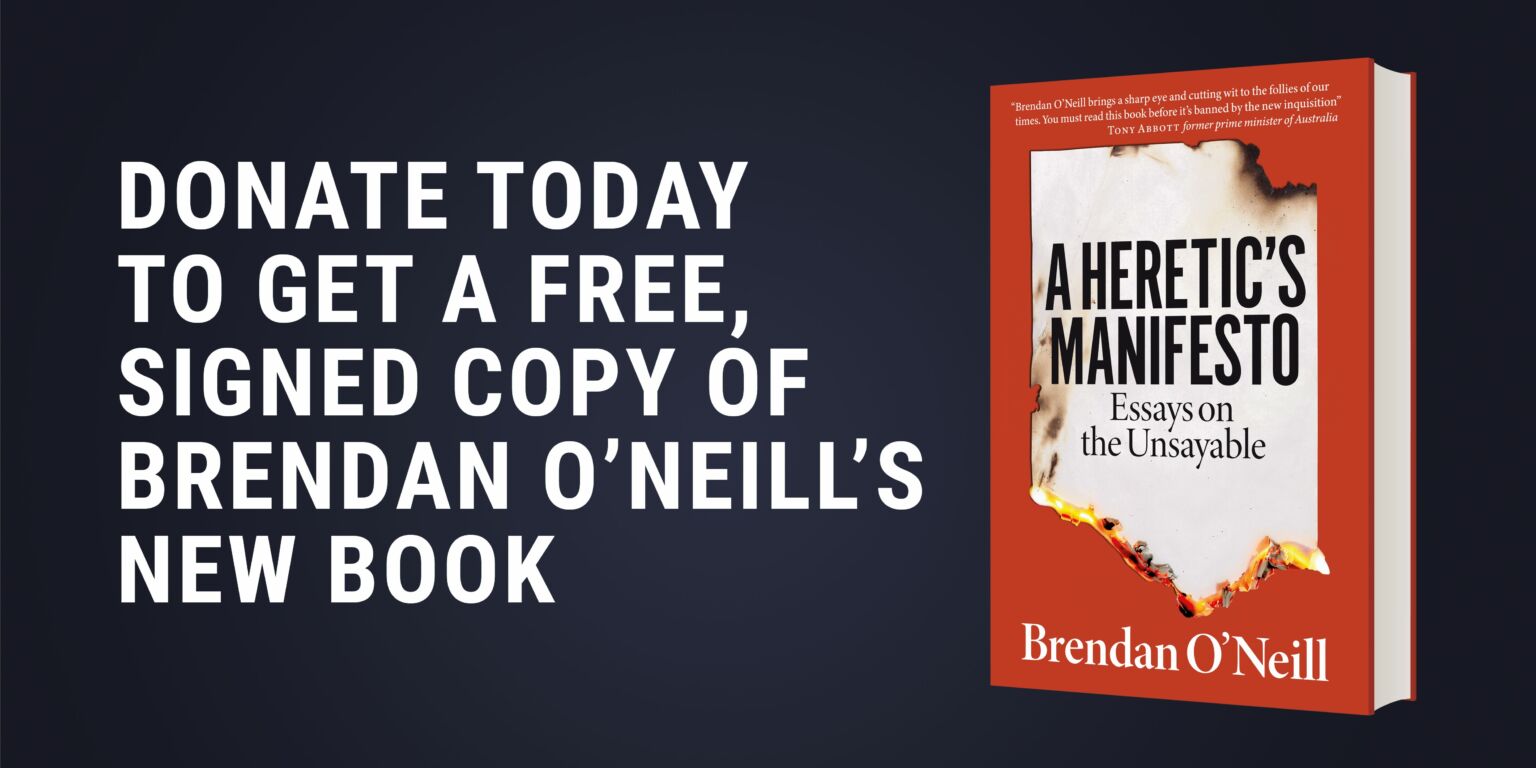Apologists for shoplifting
No, petty crime is not a radical political act.

Want to read spiked ad-free? Become a spiked supporter.
‘Every little helps.’ That’s the famous slogan of the UK’s largest supermarket, Tesco. Now it has been appropriated by one middle-class journalist to justify ‘cheeky’ shoplifting sprees. Apparently, the cost-of-living crisis is an excuse for thieving. According to the anonymous author writing in the Telegraph earlier this month, it is all the supermarkets’ fault anyway. They are the ones making thievery so easy, by replacing cashiers with self-service checkouts and mobile self-scanning apps.
Such defences of shoplifting are nothing new, of course. Take the reaction to the looting during the London riots in 2011. Some radicals really believed that nicking Nike trainers was a meaningful political act. Then, in 2019, there was the publication of Vicky Osterweil’s preposterous book, In Defence of Looting. Inspired by the 2014-15 Ferguson riots in Missouri, it shot to prominence during the post-George Floyd unrest in 2020. Despite the destructive impact looting and Black Lives Matter-inspired unrest had on black-owned businesses, Osterweil argued that condemning it was actually ‘racist’ and stoking ‘anti-black’ sentiments.
Now, as the cost-of-living crisis continues to bite, we see middle-class radicals once again attempting to reframe petty crime as justified, or even moral. Last year, shoplifting rose by 22 per cent in England and Wales. And some have defended it as an understandable act of despair by the poor. As Guardian commentator Owen Jones put it last year, the ‘real crime’ is that the government lets people live in poverty.
Meanwhile, others argue that shoplifting is the greedy supermarkets’ fault, for ‘profiteering’ during the inflation crisis. This ignores the fact that the big supermarkets’ profit rates have actually fallen as inflation has risen. Besides, since when did profit margins become a justification for lowlife criminality?
This unsavoury debate, in which the right-on seek to justify theft, is deeply disingenuous. The Guardian’s Helen Pidd has shown that the claim of ‘good people turning bad’ due to price hikes is, for the most part, untrue. As Pidd reports, when people are struggling to put food on the table, they tend to go to food banks or ask for help from family and friends. The repeat shoplifter, in contrast, steals expensive items in order to sell them on, usually for drugs and alcohol. Pidd has found that addiction rather than poverty is the key driver of shoplifting.
Addiction cannot account for the recent rise in shoplifting, however. That can be attributed, in the main, to the police no longer taking theft seriously. In fact, the theft of goods worth under £200 is now not viewed as a major crime and is rarely investigated. Much of policing now focusses on managing people’s hurt feelings and anxieties, rather than protecting property. The more the police prioritise combating ‘hate speech’ the less time and resources they have for tackling actual crimes, like theft. This aversion to pursuing low-level crime has effectively become an invitation for repeat offenders to treat local stores as their own personal larders. Those who do end up in court will be given a lenient sentence on the grounds that ‘it’s only bacon, your honour’. As Pidd discovered, though, one successful goods grab by a thief can mean the loss of a day’s wages for many small businesses.
Osterweil and other shoplifting apologists argue that it is a victimless crime. They claim that only the insurance companies lose out. That is clearly not true for smaller traders. And larger supermarkets that are consistently targeted by shoplifters will often close branches, leading to job losses. To cover the estimated £4.21 billion lost annually in shoplifting, price rises are passed on to paying customers.
Despite what the woke say, shoplifting is not a harmless, victimless crime. Retail workers are often harassed, abused and physically injured in the process. It is often forgotten that during the 2011 London riots, five people were killed by looters on the rampage – three of whom were attempting to protect their neighbourhoods and businesses.
Middle-class journalists who lionise shoplifting may believe they are empathising with the poor. In reality, they’re doing ordinary people a grave disservice. They are denying that working-class people have any moral agency or responsibility for their own lives. Rather than turning to crime, most people in difficult financial circumstances will rely on family and friends or take additional jobs to pay their way. They may retrain or move to find better-paid work in other sectors. And those in work may take collective action to increase their wages. But the shoplifting apologists ignore all of this.
The last thing ordinary people need is for middle-class journalists and academics to reinforce the poisonous narrative that working-class people are always on the verge of criminality. It only cements the association between being financially poor and being morally poor. We should reject this infantile, faux-radical posturing.
Neil Davenport is a writer based in London.
Picture by: Getty.
Celebrate 25 years of spiked!
A media ecosystem dominated by a handful of billionaire owners, bad actors spreading disinformation online and the rich and powerful trying to stop us publishing stories. But we have you on our side. help to fund our journalism and those who choose All-access digital enjoy exclusive extras:
- Unlimited articles in our app and ad-free reading on all devices
- Exclusive newsletter and far fewer asks for support
- Full access to the Guardian Feast app
If you can, please support us on a monthly basis and make a big impact in support of open, independent journalism. Thank you.








Comments
Want to join the conversation?
Only spiked supporters and patrons, who donate regularly to us, can comment on our articles.